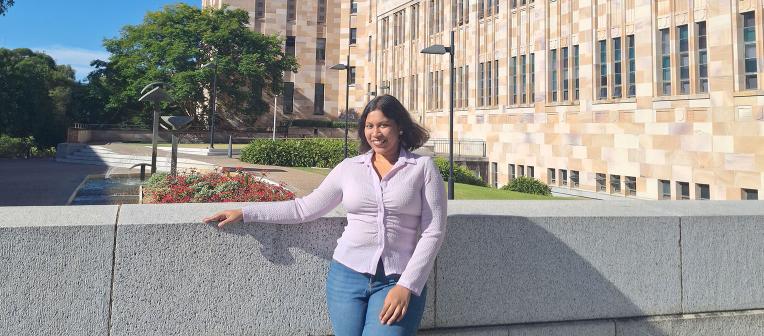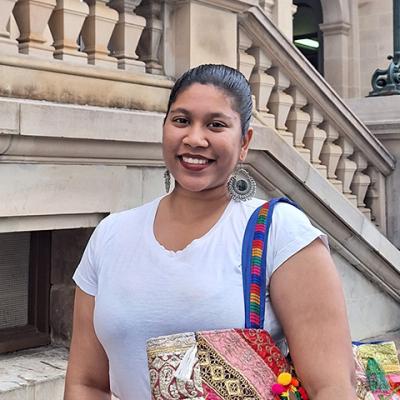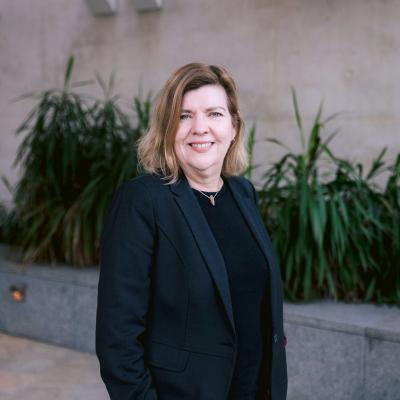Considering a postgraduate degree in social work? Whether you’re aiming to become a qualified social worker or make a career change, UQ’s Master of Social Work (Qualifying) can help you reach your goals.
To give you a deeper understanding of the program, we’ve gathered insights from current students Esha Sonarikar and Phoebe McLaren, as well as recent graduate Matheus Adorno, who now works in the field providing psychosocial outreach to adults with severe mental illness and those facing homelessness.
Discover why they chose UQ and their advice for others considering this path.
What does Master of Social Work (Qualifying) mean?
The Master of Social Work (Qualifying) is a postgraduate degree for those with an undergraduate background in areas like psychology, sociology, or human services. The "Qualifying" label means it meets accreditation standards, allowing graduates to become professional social workers. The program blends academic coursework with practical placements to prepare students for the field.
What inspired you to undertake social work at a postgraduate level?
Esha: With my bachelor's in psychology and a minor in sociology, I wanted to broaden my skill set and explore different areas of practice. When I discovered UQ's Master of Social Work, I was drawn to the wide range of opportunities in fields like health, mental health, law, policy, government, education, and community work. Social work is an all-encompassing profession that supports people in vulnerable conditions, and my background in psychology and sociology felt like the ideal foundation to build upon. Now, with both degrees, I can provide therapeutic and practical support while advocating for my clients.
Phoebe: Completing a Bachelor of Public Health and Health Promotion highlighted the importance of working with communities to improve health and wellbeing. During my honours year, I conducted my own research, which sparked a deeper interest in working with individuals. My experience in an administrative role in mental health was the final catalyst for applying to UQ's Master of Social Work. Seeing first-hand the dynamic and critical role social workers play in mental health services solidified my decision to pursue a career in social work.
Matheus: After completing a bachelor’s degree in counselling, I felt the need for more education on the broader social, political, and cultural systems that closely intertwine with mental health and wellbeing. After researching, I found UQ to be the right fit for me. UQ offered world-class recognition in the field of social work, a curriculum that thoroughly covered the diversity of social work practice, and student support services and facilities to help me navigate the challenges of completing a master’s degree.
What has been your favourite course in the program, and why did it stand out to you?
Esha: One of my favourite courses has been Direct Practice. This is the bread and butter of social work. Through this course, I learned how to engage with clients, build strong therapeutic relationships, and conduct effective consultations. In our small weekly tutorial groups, our tutor provided personalised feedback on how we navigated various practice scenarios during simulations with actors. We also participated in conversation cafes – peer discussion groups – that further enhanced our understanding. This hands-on experience was invaluable in building my competence as a social worker.
Phoebe: As someone aspiring to work in mental health, I particularly enjoyed the course Professional Practice in Mental Health. This subject encouraged critical thinking and pushed us to reflect on how we can apply social work professional standards to promote the safety and wellbeing of those we serve. We delved into the unique perspective and contribution of social work in a field often dominated by biomedical models, enhancing our ability to respond to individuals with empathy, flexibility, and confidence. By participating in the challenging simulation assessments, we developed essential skills for navigating difficult conversations about mental health and suicide – topics that social workers frequently encounter, even outside of mental health settings.
Matheus: It’s hard to choose a single favourite course from my time at UQ, as many were impactful. A standout was the way courses seamlessly integrated theory with practice. Many courses paired classroom learning with real-life experiences, which made abstract concepts more tangible and applicable.
The diversity of the curriculum was another highlight. From child protection to mental health and community development, the range of courses prepared us well for various roles in social work. Additionally, the engaging teaching methods – such as case studies, simulations, and interactive discussions – made the learning process dynamic and inspiring, deepening my understanding and passion for the field.
What did you learn during your social work placements?
Esha: My placement at a Queensland Government Hospital, where I worked with cancer patients, effectively bridged the gap between theory and practice, reinforcing and deepening the concepts I had studied during my postgraduate program. This hands-on experience not only allowed me to apply clinical social work skills but also played a crucial role in refining my professional identity. Working with individuals from diverse backgrounds, combined with the insights gained from my coursework, enabled me to develop a comprehensive practice framework. This exposure helped me build significant confidence in my abilities, enhancing both my practical skills and my understanding of the complexities of social work.
Phoebe: During my placement, I developed practical skills and observed how theory integrates with everyday social work. It was an ideal setting for reflecting on the theoretical aspects guiding our practice. Learning from experienced social workers helped me adapt my approach to fit my unique values and style. I discovered that social work isn’t about rigid professionalism or always saying the right thing; it’s about bringing personality, fun, and joy to the role. The true beauty of social work is its authentic, person-centred approach within a multidisciplinary team. This experience taught me to stay true to my personal style and values, showing me that there are countless ways to excel as a social worker.
Matheus: My placements were instrumental in shaping my approach to social work after graduating from UQ. They allowed me to apply social work theories in real-life practical settings, bringing classroom concepts to life. These experiences also provided opportunities for reflection and improvement, enhancing my ability to build strong professional relationships. The hands-on practice and feedback from supervisors and peers were invaluable in developing my skills and confidence as a social worker.
What has been your favourite assignment during the program, and why did it stand out?
Esha: My favourite assignment was part of the course Professional Practice in Mental Health and it involved a 1-hour simulation where we role-played as social workers conducting an initial assessment with a client. I enjoyed this for 2 main reasons. First, the scenario allowed me to demonstrate my clinical and interpersonal skills, immersing me so deeply that it felt real. Second, the reflective writing component helped me evaluate the experience and develop a critically reflective practice framework. This assignment has instilled in me a habit of continuous professional development, which I now apply regularly to enhance my effectiveness as a social worker.
Phoebe: This one assignment involved conducting a psychosocial assessment through a simulated role-play with actors. This task required me to examine various factors affecting the individual’s life and health, create a realistic case note documenting the meeting, and analyse how social work theory informed my decision-making. Initially, the assignment felt daunting, but as I progressed through each section, I was able to reflect on my practice as an emerging social worker. This experience taught me practical skills in clinical documentation and reflective practice, as well as the critical importance of understanding and applying social work theories to inform my practice.
What does a day in the life of a social work postgrad student look like?
Esha: During coursework semesters, my day begins with engaging lectures and tutorials alongside enthusiastic classmates. These sessions cover a range of topics, from social policies to critical theories, providing a strong theoretical foundation for our practice. After class, I often take a coffee break before heading to the campus libraries to study. The libraries are well-stocked with resources on every imaginable topic, making them ideal for deepening my understanding of course material.
In placement semesters, my routine shifts to spending 4 days a week, 7 hours a day on placement, gaining hands-on experience. Despite the busy schedule, I still make time to head to UQ after work to catch up with friends and enjoy the free dinners provided by the UQ Union.
Phoebe: Every day is unique, which is one of the most appealing aspects of this journey. Your weeks are a dynamic mix of studying, attending classes, socialising, working, and squeezing in hobbies whenever possible. The self-directed nature of postgraduate learning allows you to create a schedule that suits your lifestyle.
- Mornings often start with engaging lectures and tutorials, followed by group discussions or workshops.
- Afternoons might involve independent study in the library or hands-on experiences during placements.
- Evenings offer a chance to unwind and connect with peers, whether it’s grabbing a coffee, enjoying the campus experience, or attending social events.
Overall, the postgraduate journey is a blend of academic rigor, practical application, and personal growth.
What specific skills have you gained through the program that you feel will be most valuable in your career as a social worker?
Esha: The interpersonal skills I developed through this program are invaluable to my career as a social worker. These skills are the foundation of social work practice, essential for engaging with marginalised individuals daily and building therapeutic relationships crucial for effective service delivery. Additionally, I have crafted a personalised practice framework that is adaptable to various social work contexts. This flexibility and adaptability give me a distinct advantage in the field. The program also instilled core social work ethics and values in me: respect for persons, professional integrity, social justice, and holistic, person-centred practice. These principles form the foundation of every social work intervention I undertake.
Phoebe: I have developed the ability to critically reflect on my practice and use those reflections to continually improve, an instrumental skill for any social worker. The program has also equipped me with the interpersonal skills needed for meaningful, empathetic conversations, and the academic skills to conduct and evaluate research. Additionally, I have honed the critical skills required to work effectively with individuals and their families, as well as the invaluable ability to collaborate cohesively within a diverse team.
Matheus: My understanding of cultural competence has evolved profoundly through my studies and professional experiences in social work. Initially, I saw it as simply being aware of and respecting diverse backgrounds. However, my education at UQ deepened my perspective through subjects that emphasised cultural safety and sensitivity, providing a solid theoretical foundation. Engaging with diverse clients during placements taught me to view the world through my clients’ lenses, enhancing my empathy and understanding. This shift allowed me to adopt a more holistic approach to my practice, recognising the complex interplay of cultural, social, and personal factors in each client’s life.
Commitment to diversity and inclusion
At UQ, we celebrate diversity and inclusion to create a supportive learning environment for everyone. These values are at the heart of our social work programs, teaching students how to respect, understand and help people from different backgrounds and diverse communities. By the end of your degree, you’ll feel prepared to support people of all races, ethnicities, genders, sexual orientations, and ages.
What advice would you give to someone considering pursuing a Master of Social Work at UQ?
Matheus: Reflecting on my journey, here are a few key pieces of advice for anyone considering a Master of Social Work at UQ:
- Get involved: Participate in workshops, projects, and extracurricular activities to gain practical skills, expand your network, and deepen your understanding of the field.
- Commit to reflective practice: Regularly reflect on your experiences and stay committed to continuous learning through education, workshops, and self-study.
- Be trauma-aware and culturally aware: Understand trauma and cultural diversity. Continuously review your biases to provide non-judgmental, trauma-informed, and culturally safe services.
- Build a support network: Social work can be emotionally demanding. Surround yourself with peers, mentors, and professionals for guidance and support.
- Stay passionate and compassionate: Maintain your passion for social justice and compassion in all your interactions.
Is UQ the best place to study counselling, mental health and social work?
If you want to study social work, counselling or mental health courses and programs at university, UQ offers graduates a competitive edge. We’re ranked:
- #2 in Australia and #24 in the world for psychology, according to Times Higher Education World University Rankings 2026
- #4 in Australia and #37 in the world for life sciences and medicine, according to QS World University Rankings by Subject 2025
- =#2 in Australia for psychology, according to Shanghai Ranking 2025 Global Ranking of Academic Subjects.
How can you study social work at UQ?
At UQ, you can study social work in the following programs:
Find out how to get postgrad ready in 12 months or discover what it’s like to study postgraduate programs in other fields of interest.








